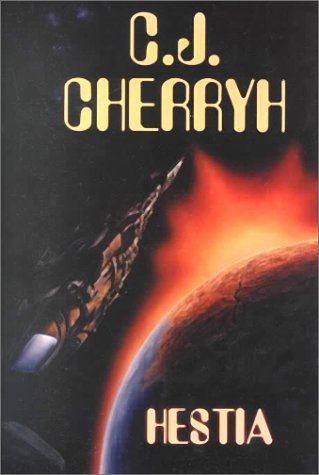
Hestia
Book Description
On a crumbling planet where survival hinges on ancient alliances and treacherous betrayals, the fate of humanity teeters on a knife's edge. Hestia, a world ravaged by conflict, holds secrets that could shift the balance of power forever. As factions clash and loyalties are tested, a daring group uncovers dark truths that challenge everything they believe. Friendships fracture and love ignites amidst the chaos, but trust is as fragile as the ground beneath their feet. When the dust settles, who will emerge victorious, and at what cost? Can hope endure in the face of relentless despair?
Quick Book Summary
"Hestia" by C.J. Cherryh is a compelling science fiction novel set on a fractured planet where colonists struggle for survival amid environmental hazards and political intrigue. Humanity’s tenuous future on Hestia depends on a delicate balance between the needs of the settlers and the native alien population. When a new engineer, Sam Merrit, arrives to construct a critical dam, he finds himself entangled in the planet’s deep-seated conflicts. As alliances waver and betrayals mount, Sam must navigate hostile terrain, divided communities, and a burgeoning romance that challenges his loyalties. The story explores themes of trust, survival, and the possibility of hope in a world overshadowed by despair. Ultimately, choices made by individuals ripple outward, shaping the destiny of a planet on the brink.
Summary of Key Ideas
Table of Contents
Survival Amid Adversity
On the planet Hestia, colonists cling to survival in a harsh, unforgiving environment. The settlers depend on expanding arable land and securing infrastructure, especially a much-needed dam to protect against devastating floods. The land is precariously shared with the native, centaur-like Indigenes, whose delicate way of life is already strained by the encroachment of human technology and expansion. As environmental hazards loom, survival becomes a collective challenge, but decades of mistrust and violence between the groups threaten to unravel any hope of coexistence.
Inter-species Conflict and Understanding
The arrival of engineer Sam Merrit brings new energy to the colonists’ dam project, but also stirs old tensions between humans and Indigenes. While the settlers see technological progress as a means to survival, the Indigenes view it as a dire threat to their ancestral home. Sam is forced into the heart of the conflict, witnessing hostility, sabotage, and the consequences of inherited prejudice. As he grapples with divided loyalties, Sam begins to question humanity’s right to dominance and the price extracted from the planet’s original inhabitants.
The Cost of Betrayal and Loyalty
Amid the chaos, relationships are tested and betrayals come to light. The boundaries between friend and foe blur as members of both communities act out of desperation and fear. Sam becomes entangled with an enigmatic local woman, complicating his perspective and increasing his stake in Hestia’s fate. With every move, the prospect of betrayal hovers—dangerous secrets, hidden motives, and shifting alliances threaten to upend fragile trust. The interpersonal dynamics reflect the broader political struggle, echoing the costs of loyalty in uncertain times.
Environmental Stewardship and Human Impact
As power struggles escalate, the conflict over the dam comes to symbolize the broader tension between destruction and stewardship. The environmental consequences of unbridled development play out, forcing all sides to confront what they stand to lose. Through Sam’s journey and the choices of those around him, the narrative interrogates humanity’s relationship with nature and the moral imperatives of guardianship versus exploitation.
Redemption Through Connection
In the end, "Hestia" offers a meditation on hope and redemption in a world rife with suspicion and sorrow. The hard-won connections forged between enemies show the possibility of healing, even after loss. Sam’s arc demonstrates that courage, compassion, and an openness to understanding others can forge pathways to peace and renewal. Yet, the cost is significant, and the novel leaves readers pondering the sacrifices required for survival—not just in the physical landscape, but within the human heart.
Download This Summary
Get a free PDF of this summary instantly — no email required.





